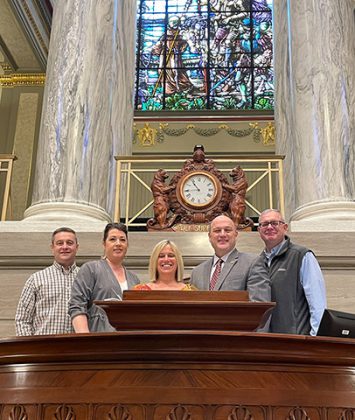
Spending Uncle Sam’s Money
One of my colleagues, a member of the minority party, described the $45 billion 2023 state budget voted out of the Senate this week as “one of the most progressive budgets we have ever done.” Another senator said the massive spending bills moving through the Legislature this year represented “the death of fiscal conservatism” in Missouri. Unfortunately, I believe both statements are correct. In fact, on the Senate floor, I said we’re spending money like a drunken sailor. The amount of money the state of Missouri is preparing to spend next year is staggering. The Department of Natural Resources’ budget grows by nearly 50%. The Department of Mental Health gets a 23% increase. Health and Senior Services grows by 25% and the Department of Social Services spends 35% more than it did last year. I voted against each of these bloated appropriations bills, but my view did not prevail.

Defenders of this spending point to a massive influx of money from federal programs Congress passed in response to COVID-19. And while it’s true many of the items in next year’s budget are one-time appropriations funded with federal money, there are also commitments being made that will stay with us long after Uncle Sam’s money is gone.
There are parts of next year’s budget I do support. We’ve applied some of the federal money to outstanding debt, clearing the state’s books of many bond obligations. There’s more money for veterans homes. We’re satisfying a court judgement against the state and paying back wages due to employees of the Corrections Department. This year’s budget also fully funds the state’s share of school transportation costs – a move that will allow our schools to devote more of their resources to actually educating students. These are all good uses of the extra money we have available. But, on the whole, I believe the 2023 budget represents a dangerous expansion of government programs in Missouri. The differences between the Senate’s budget and the original House appropriations bills still need to be ironed out in conference, but I have no hope the final product will be significantly more frugal than what we’ve already seen.
In other legislative action, my hopes for bringing legalized sports betting to Missouri appears to have hit a brick wall of opposition from Missouri’s casino gambling industry. This year, I offered Senate Bill 643, a sportsbook bill. I also sponsored separate legislation to create a network of video lottery terminals (VLT) under the supervision of state regulators. Lobbyists for Missouri’s casinos backed an alternative sports wagering proposal, House Bill 2502. Several provisions of this bill gave me pause because they left too much money in the hands of the casinos, shorted money to Missouri veterans’ homes and education, and did little to nothing to combat problem gambling. My legislation taxed sports bets at 21% − the same rate casinos agreed to pay on table bets – but the casinos wanted this to drop to 8%. Comparing the fiscal notes on the two bills, the difference amounted to about $150 million dollars per year in the pockets of casinos rather than Missouri education and veterans’ homes. When HB 2502 came up on the floor this week, I was able to work out a compromise that raised more money for education — or I thought. As the legislation came before the Senate, an amendment was offered to destroy the compromise I had worked so hard with the bill handler and other senators to pass. This change will prevent the bill’s passage. I am extremely disappointed in this outcome because it is an example of casino greed winning out over the interest of Missouri’s school kids and veterans.
Another disappointing development relates to House Bill 1720, a comprehensive package of legislation intended to expand opportunities for farmers and rural businesses in Missouri. I wrote about this bill in a previous column and mentioned the Senate substitute contained a number of provisions I sponsored this year and in the past. This week, the House rejected the Senate version and asked for the bill to be reconciled by a conference committee. As that effort proceeds, I’ll be encouraging my colleagues to keep my provisions intact. Among those are the “Missouri Rural Workforce Development Act,” a measure aimed at encouraging investment in rural businesses I sponsored separately as Senate Bill 905, and incentives to spur production and use of biodiesel fuels in Missouri I introduced this year as Senate Bill 805. Other provisions I believe need to stay in the bill are tax credits for meat processing facilities and timber products producers, and a renewal of the Missouri Agriculture and Small Business Development Authority, or MASBDA. Each of these measures were included in my Senate Bill 644.
We’re coming down to the wire in the 2022 legislative session. The budget is due to the governor on May 6, and the rest of our work must be concluded on May 13. Typically, the final days of the legislative session brings a flurry of activity on the floor with many bills moving forward and other measures added as amendments. Stay tuned, as I expect to have a lot to report in the coming weeks.
As always, I appreciate hearing your comments, opinions and concerns. Please feel free to contact me in Jefferson City at (573) 751-4302. You may also email me at denny.hoskins@senate.mo.gov.
